University Report: Ethical Decision-Making in Leadership
VerifiedAdded on 2020/04/15
|18
|3692
|36
Report
AI Summary
This report delves into the critical aspects of ethical decision-making in leadership, examining its profound impact on organizational success. It begins by defining leadership and explores the significance of ethical conduct and character in leaders, highlighting their role as role models. The literature review covers the concept of ethical leadership, the interplay between ethical leadership and decision-making within organizations, and the outcomes of ethical leadership, supported by scholarly research. The analysis section focuses on the habits of strong ethical leaders, the ethical decision-making process, and the role of leadership in shaping organizational behavior and culture. The report also offers practical recommendations for improving ethical decision-making processes within organizations, and concludes by summarizing key findings and implications, emphasizing the need for continuous improvement in leadership practices to align with globalization, technology, and diversity.
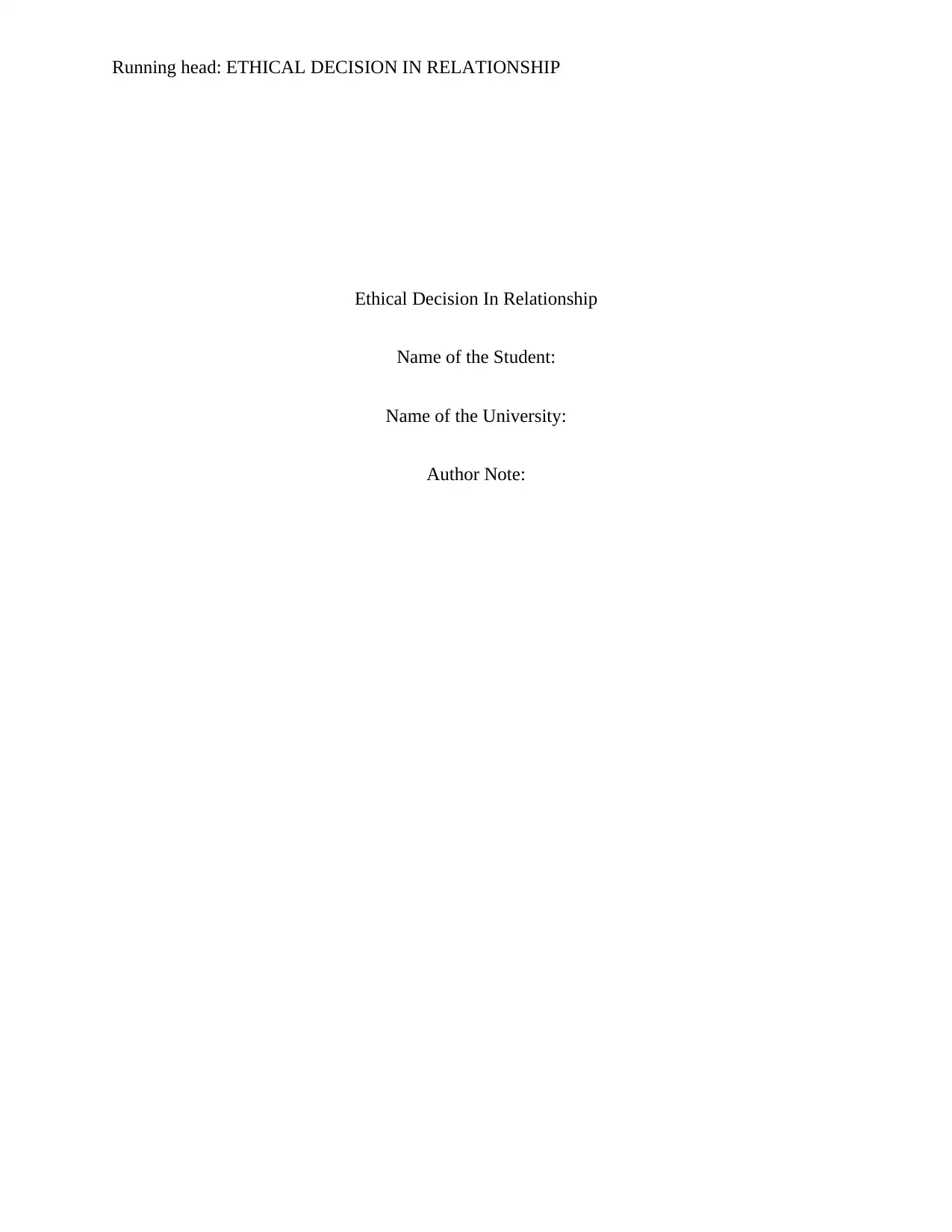
Running head: ETHICAL DECISION IN RELATIONSHIP
Ethical Decision In Relationship
Name of the Student:
Name of the University:
Author Note:
Ethical Decision In Relationship
Name of the Student:
Name of the University:
Author Note:
Paraphrase This Document
Need a fresh take? Get an instant paraphrase of this document with our AI Paraphraser
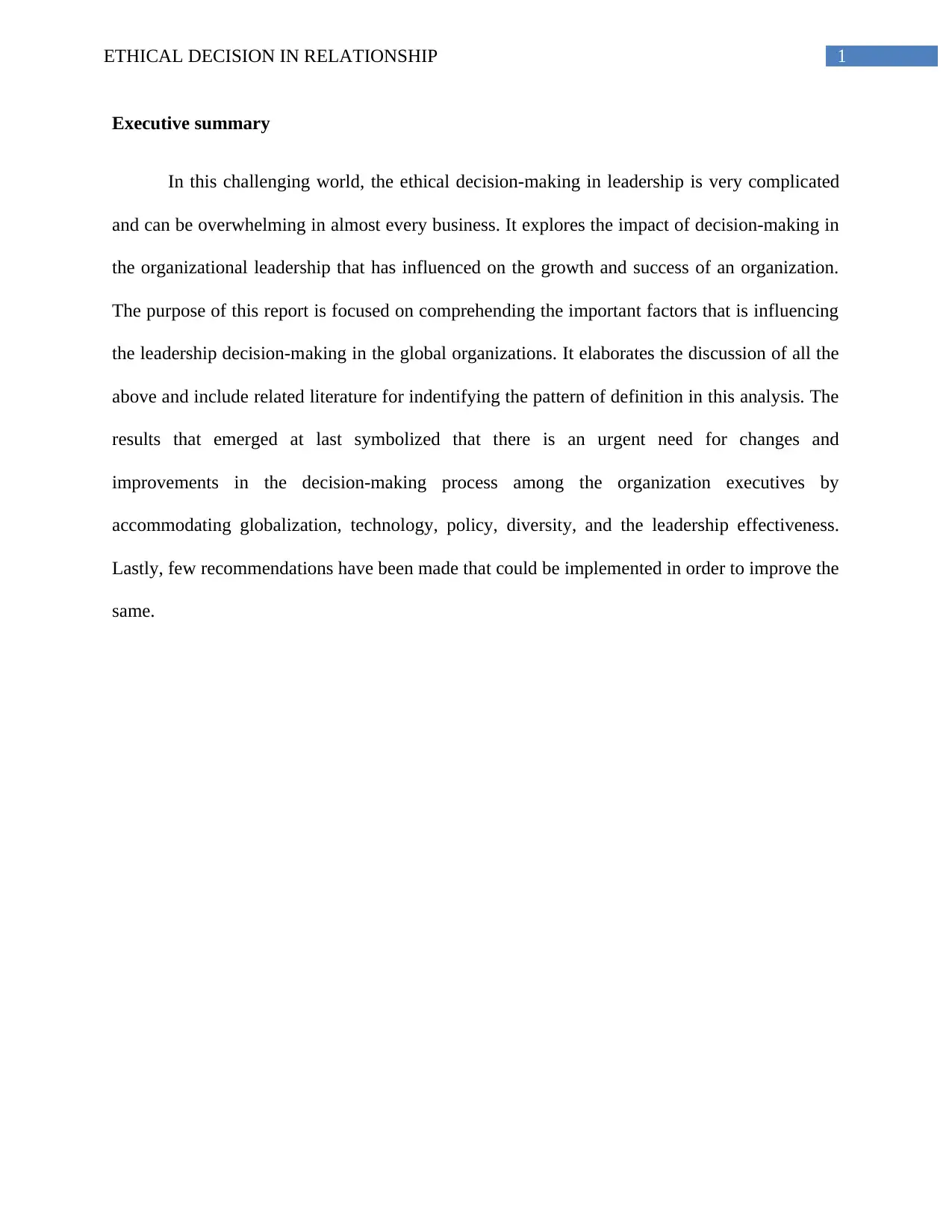
1ETHICAL DECISION IN RELATIONSHIP
Executive summary
In this challenging world, the ethical decision-making in leadership is very complicated
and can be overwhelming in almost every business. It explores the impact of decision-making in
the organizational leadership that has influenced on the growth and success of an organization.
The purpose of this report is focused on comprehending the important factors that is influencing
the leadership decision-making in the global organizations. It elaborates the discussion of all the
above and include related literature for indentifying the pattern of definition in this analysis. The
results that emerged at last symbolized that there is an urgent need for changes and
improvements in the decision-making process among the organization executives by
accommodating globalization, technology, policy, diversity, and the leadership effectiveness.
Lastly, few recommendations have been made that could be implemented in order to improve the
same.
Executive summary
In this challenging world, the ethical decision-making in leadership is very complicated
and can be overwhelming in almost every business. It explores the impact of decision-making in
the organizational leadership that has influenced on the growth and success of an organization.
The purpose of this report is focused on comprehending the important factors that is influencing
the leadership decision-making in the global organizations. It elaborates the discussion of all the
above and include related literature for indentifying the pattern of definition in this analysis. The
results that emerged at last symbolized that there is an urgent need for changes and
improvements in the decision-making process among the organization executives by
accommodating globalization, technology, policy, diversity, and the leadership effectiveness.
Lastly, few recommendations have been made that could be implemented in order to improve the
same.
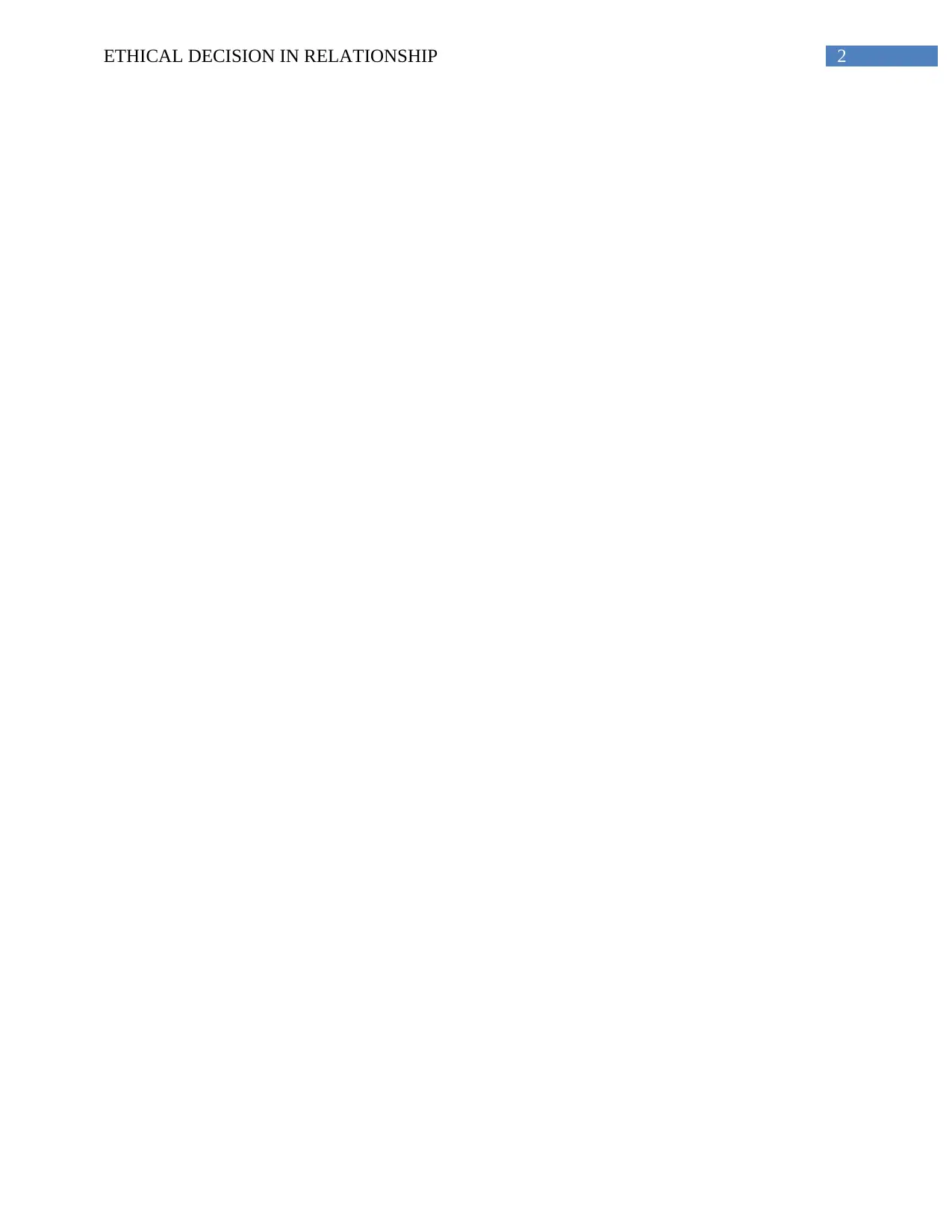
2ETHICAL DECISION IN RELATIONSHIP
⊘ This is a preview!⊘
Do you want full access?
Subscribe today to unlock all pages.

Trusted by 1+ million students worldwide
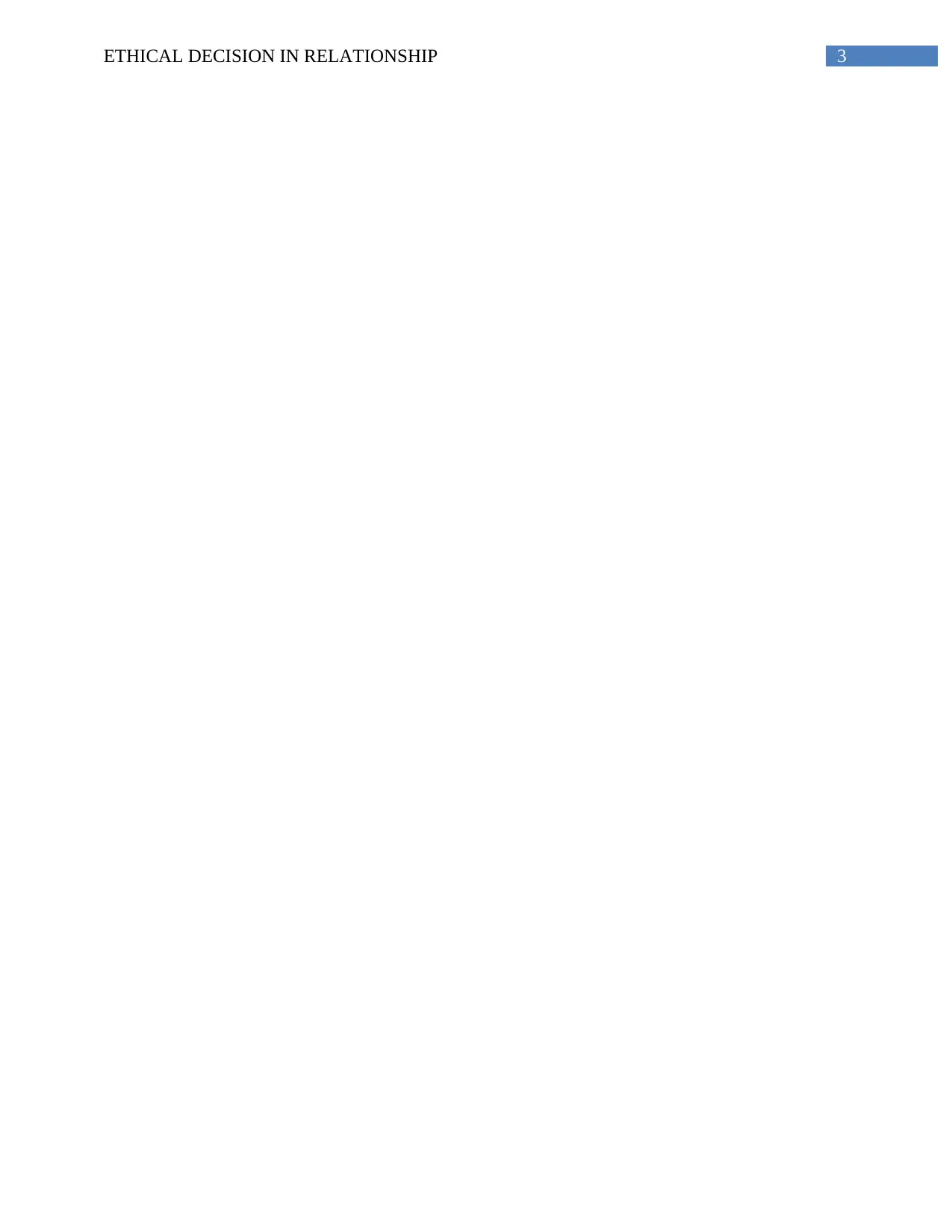
3ETHICAL DECISION IN RELATIONSHIP
Paraphrase This Document
Need a fresh take? Get an instant paraphrase of this document with our AI Paraphraser
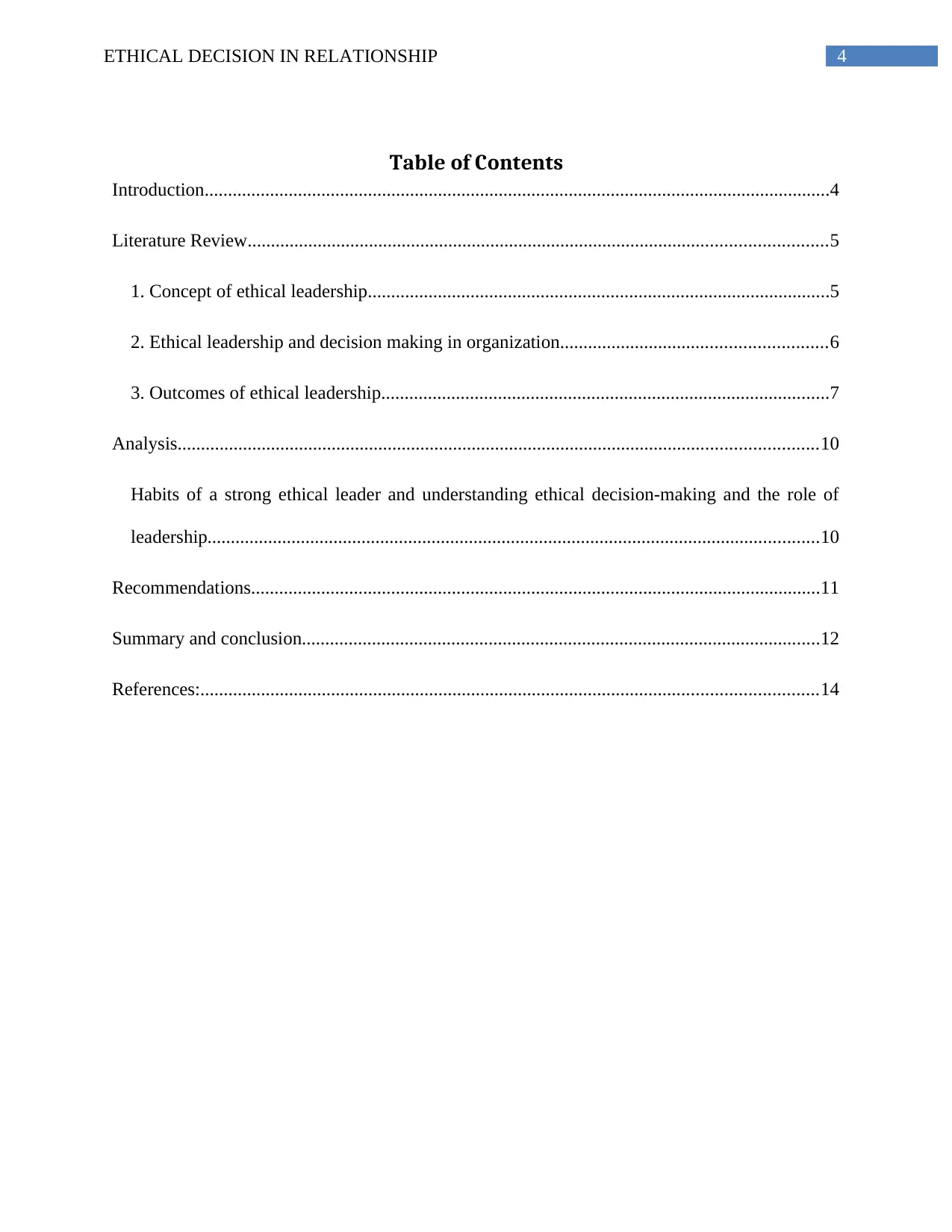
4ETHICAL DECISION IN RELATIONSHIP
Table of Contents
Introduction......................................................................................................................................4
Literature Review............................................................................................................................5
1. Concept of ethical leadership...................................................................................................5
2. Ethical leadership and decision making in organization.........................................................6
3. Outcomes of ethical leadership................................................................................................7
Analysis.........................................................................................................................................10
Habits of a strong ethical leader and understanding ethical decision-making and the role of
leadership...................................................................................................................................10
Recommendations..........................................................................................................................11
Summary and conclusion...............................................................................................................12
References:....................................................................................................................................14
Table of Contents
Introduction......................................................................................................................................4
Literature Review............................................................................................................................5
1. Concept of ethical leadership...................................................................................................5
2. Ethical leadership and decision making in organization.........................................................6
3. Outcomes of ethical leadership................................................................................................7
Analysis.........................................................................................................................................10
Habits of a strong ethical leader and understanding ethical decision-making and the role of
leadership...................................................................................................................................10
Recommendations..........................................................................................................................11
Summary and conclusion...............................................................................................................12
References:....................................................................................................................................14
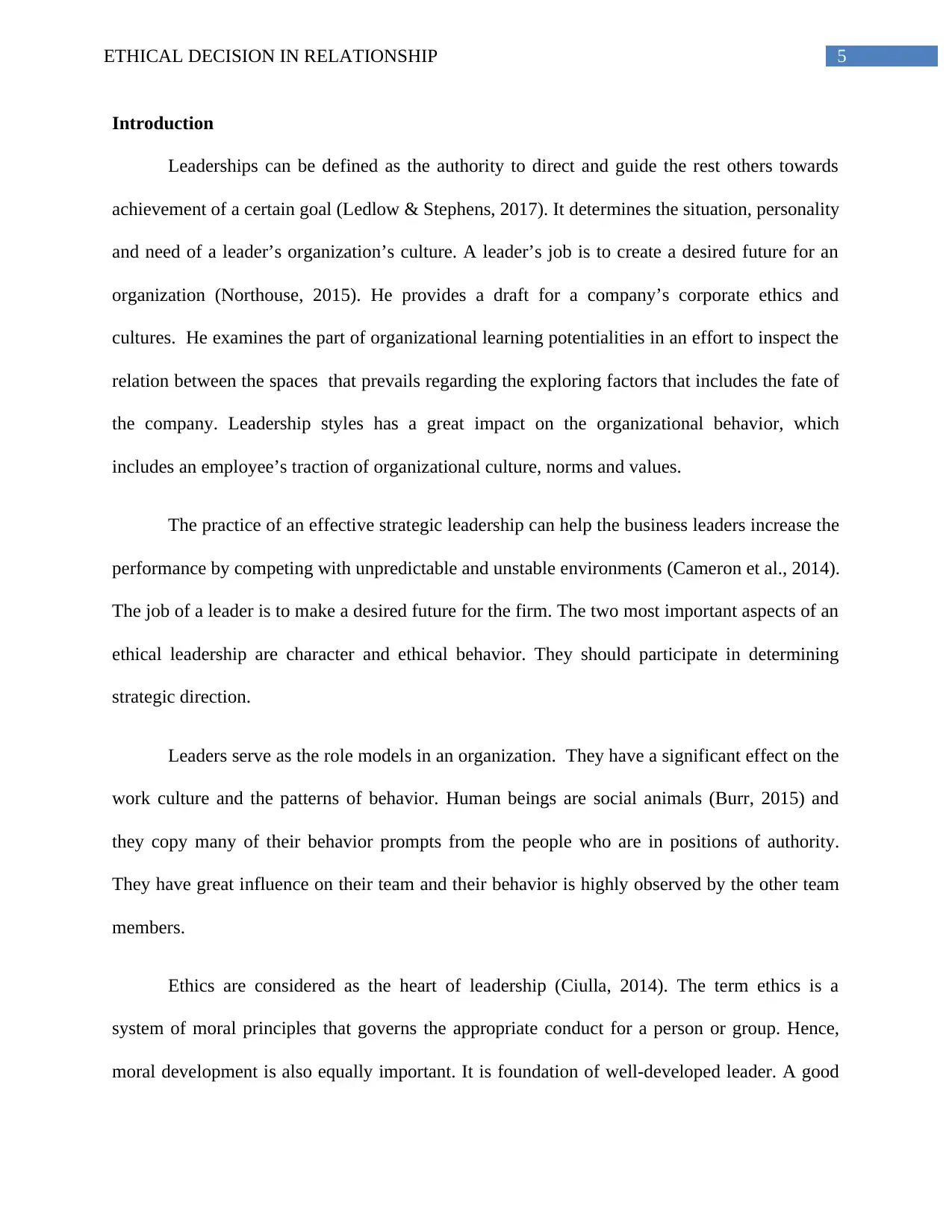
5ETHICAL DECISION IN RELATIONSHIP
Introduction
Leaderships can be defined as the authority to direct and guide the rest others towards
achievement of a certain goal (Ledlow & Stephens, 2017). It determines the situation, personality
and need of a leader’s organization’s culture. A leader’s job is to create a desired future for an
organization (Northouse, 2015). He provides a draft for a company’s corporate ethics and
cultures. He examines the part of organizational learning potentialities in an effort to inspect the
relation between the spaces that prevails regarding the exploring factors that includes the fate of
the company. Leadership styles has a great impact on the organizational behavior, which
includes an employee’s traction of organizational culture, norms and values.
The practice of an effective strategic leadership can help the business leaders increase the
performance by competing with unpredictable and unstable environments (Cameron et al., 2014).
The job of a leader is to make a desired future for the firm. The two most important aspects of an
ethical leadership are character and ethical behavior. They should participate in determining
strategic direction.
Leaders serve as the role models in an organization. They have a significant effect on the
work culture and the patterns of behavior. Human beings are social animals (Burr, 2015) and
they copy many of their behavior prompts from the people who are in positions of authority.
They have great influence on their team and their behavior is highly observed by the other team
members.
Ethics are considered as the heart of leadership (Ciulla, 2014). The term ethics is a
system of moral principles that governs the appropriate conduct for a person or group. Hence,
moral development is also equally important. It is foundation of well-developed leader. A good
Introduction
Leaderships can be defined as the authority to direct and guide the rest others towards
achievement of a certain goal (Ledlow & Stephens, 2017). It determines the situation, personality
and need of a leader’s organization’s culture. A leader’s job is to create a desired future for an
organization (Northouse, 2015). He provides a draft for a company’s corporate ethics and
cultures. He examines the part of organizational learning potentialities in an effort to inspect the
relation between the spaces that prevails regarding the exploring factors that includes the fate of
the company. Leadership styles has a great impact on the organizational behavior, which
includes an employee’s traction of organizational culture, norms and values.
The practice of an effective strategic leadership can help the business leaders increase the
performance by competing with unpredictable and unstable environments (Cameron et al., 2014).
The job of a leader is to make a desired future for the firm. The two most important aspects of an
ethical leadership are character and ethical behavior. They should participate in determining
strategic direction.
Leaders serve as the role models in an organization. They have a significant effect on the
work culture and the patterns of behavior. Human beings are social animals (Burr, 2015) and
they copy many of their behavior prompts from the people who are in positions of authority.
They have great influence on their team and their behavior is highly observed by the other team
members.
Ethics are considered as the heart of leadership (Ciulla, 2014). The term ethics is a
system of moral principles that governs the appropriate conduct for a person or group. Hence,
moral development is also equally important. It is foundation of well-developed leader. A good
⊘ This is a preview!⊘
Do you want full access?
Subscribe today to unlock all pages.

Trusted by 1+ million students worldwide
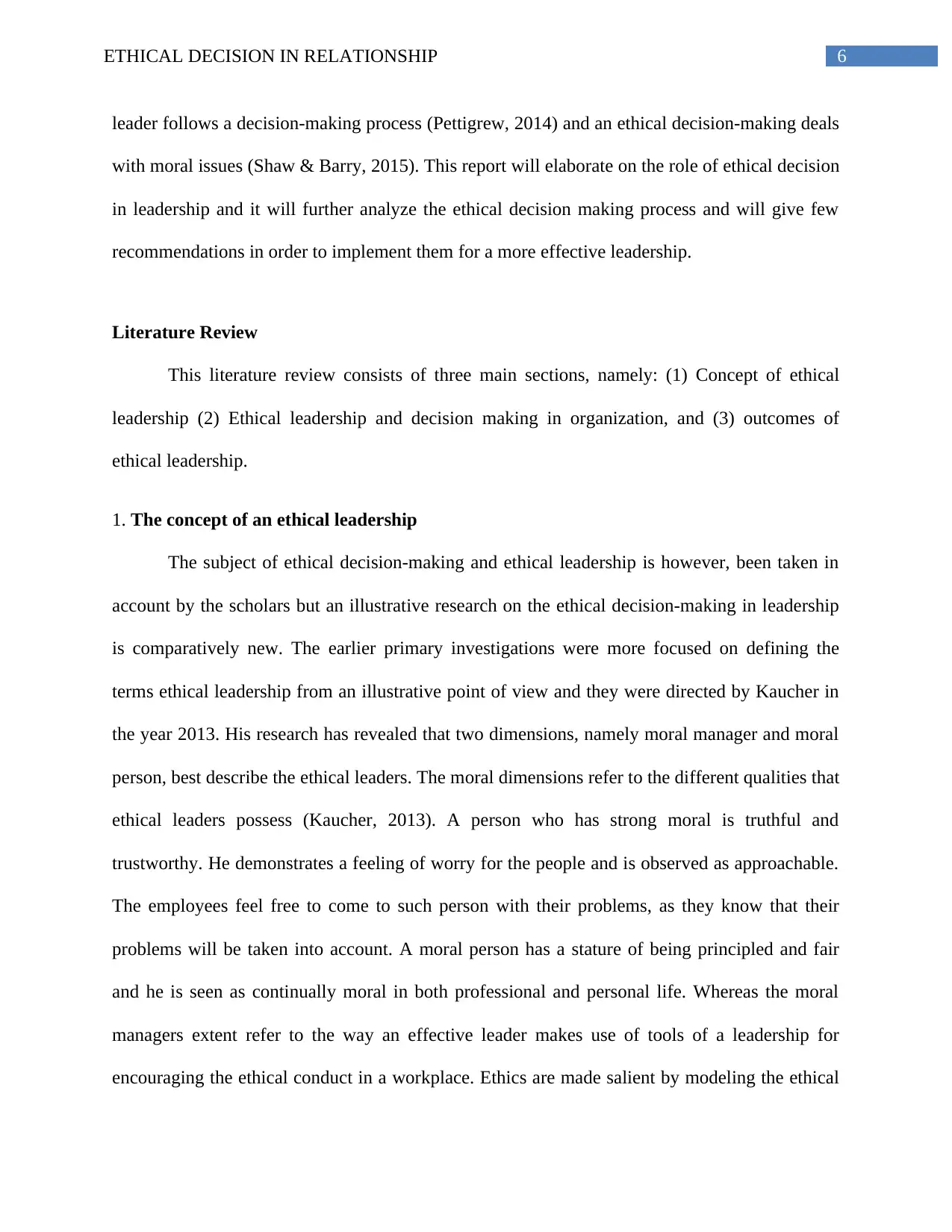
6ETHICAL DECISION IN RELATIONSHIP
leader follows a decision-making process (Pettigrew, 2014) and an ethical decision-making deals
with moral issues (Shaw & Barry, 2015). This report will elaborate on the role of ethical decision
in leadership and it will further analyze the ethical decision making process and will give few
recommendations in order to implement them for a more effective leadership.
Literature Review
This literature review consists of three main sections, namely: (1) Concept of ethical
leadership (2) Ethical leadership and decision making in organization, and (3) outcomes of
ethical leadership.
1. The concept of an ethical leadership
The subject of ethical decision-making and ethical leadership is however, been taken in
account by the scholars but an illustrative research on the ethical decision-making in leadership
is comparatively new. The earlier primary investigations were more focused on defining the
terms ethical leadership from an illustrative point of view and they were directed by Kaucher in
the year 2013. His research has revealed that two dimensions, namely moral manager and moral
person, best describe the ethical leaders. The moral dimensions refer to the different qualities that
ethical leaders possess (Kaucher, 2013). A person who has strong moral is truthful and
trustworthy. He demonstrates a feeling of worry for the people and is observed as approachable.
The employees feel free to come to such person with their problems, as they know that their
problems will be taken into account. A moral person has a stature of being principled and fair
and he is seen as continually moral in both professional and personal life. Whereas the moral
managers extent refer to the way an effective leader makes use of tools of a leadership for
encouraging the ethical conduct in a workplace. Ethics are made salient by modeling the ethical
leader follows a decision-making process (Pettigrew, 2014) and an ethical decision-making deals
with moral issues (Shaw & Barry, 2015). This report will elaborate on the role of ethical decision
in leadership and it will further analyze the ethical decision making process and will give few
recommendations in order to implement them for a more effective leadership.
Literature Review
This literature review consists of three main sections, namely: (1) Concept of ethical
leadership (2) Ethical leadership and decision making in organization, and (3) outcomes of
ethical leadership.
1. The concept of an ethical leadership
The subject of ethical decision-making and ethical leadership is however, been taken in
account by the scholars but an illustrative research on the ethical decision-making in leadership
is comparatively new. The earlier primary investigations were more focused on defining the
terms ethical leadership from an illustrative point of view and they were directed by Kaucher in
the year 2013. His research has revealed that two dimensions, namely moral manager and moral
person, best describe the ethical leaders. The moral dimensions refer to the different qualities that
ethical leaders possess (Kaucher, 2013). A person who has strong moral is truthful and
trustworthy. He demonstrates a feeling of worry for the people and is observed as approachable.
The employees feel free to come to such person with their problems, as they know that their
problems will be taken into account. A moral person has a stature of being principled and fair
and he is seen as continually moral in both professional and personal life. Whereas the moral
managers extent refer to the way an effective leader makes use of tools of a leadership for
encouraging the ethical conduct in a workplace. Ethics are made salient by modeling the ethical
Paraphrase This Document
Need a fresh take? Get an instant paraphrase of this document with our AI Paraphraser
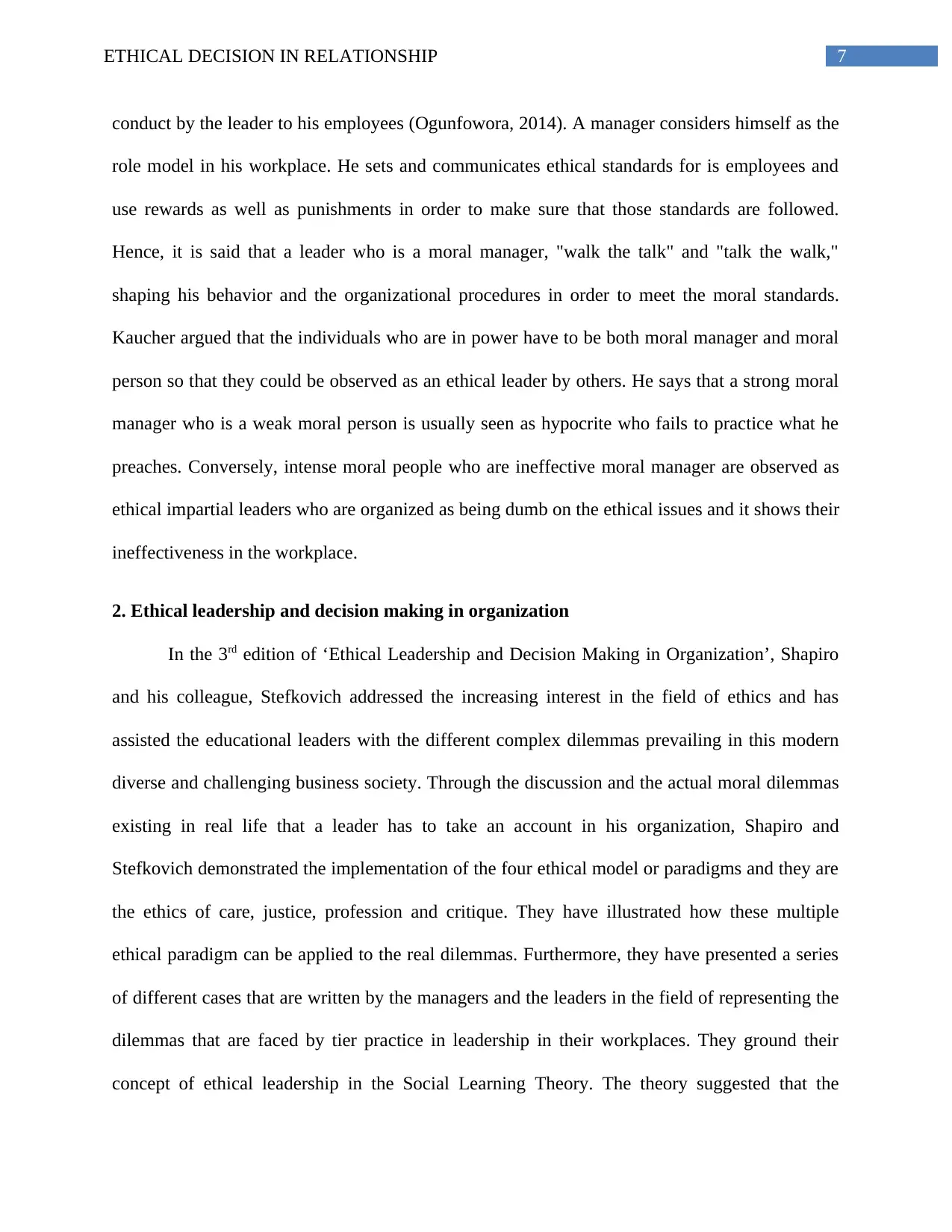
7ETHICAL DECISION IN RELATIONSHIP
conduct by the leader to his employees (Ogunfowora, 2014). A manager considers himself as the
role model in his workplace. He sets and communicates ethical standards for is employees and
use rewards as well as punishments in order to make sure that those standards are followed.
Hence, it is said that a leader who is a moral manager, "walk the talk" and "talk the walk,"
shaping his behavior and the organizational procedures in order to meet the moral standards.
Kaucher argued that the individuals who are in power have to be both moral manager and moral
person so that they could be observed as an ethical leader by others. He says that a strong moral
manager who is a weak moral person is usually seen as hypocrite who fails to practice what he
preaches. Conversely, intense moral people who are ineffective moral manager are observed as
ethical impartial leaders who are organized as being dumb on the ethical issues and it shows their
ineffectiveness in the workplace.
2. Ethical leadership and decision making in organization
In the 3rd edition of ‘Ethical Leadership and Decision Making in Organization’, Shapiro
and his colleague, Stefkovich addressed the increasing interest in the field of ethics and has
assisted the educational leaders with the different complex dilemmas prevailing in this modern
diverse and challenging business society. Through the discussion and the actual moral dilemmas
existing in real life that a leader has to take an account in his organization, Shapiro and
Stefkovich demonstrated the implementation of the four ethical model or paradigms and they are
the ethics of care, justice, profession and critique. They have illustrated how these multiple
ethical paradigm can be applied to the real dilemmas. Furthermore, they have presented a series
of different cases that are written by the managers and the leaders in the field of representing the
dilemmas that are faced by tier practice in leadership in their workplaces. They ground their
concept of ethical leadership in the Social Learning Theory. The theory suggested that the
conduct by the leader to his employees (Ogunfowora, 2014). A manager considers himself as the
role model in his workplace. He sets and communicates ethical standards for is employees and
use rewards as well as punishments in order to make sure that those standards are followed.
Hence, it is said that a leader who is a moral manager, "walk the talk" and "talk the walk,"
shaping his behavior and the organizational procedures in order to meet the moral standards.
Kaucher argued that the individuals who are in power have to be both moral manager and moral
person so that they could be observed as an ethical leader by others. He says that a strong moral
manager who is a weak moral person is usually seen as hypocrite who fails to practice what he
preaches. Conversely, intense moral people who are ineffective moral manager are observed as
ethical impartial leaders who are organized as being dumb on the ethical issues and it shows their
ineffectiveness in the workplace.
2. Ethical leadership and decision making in organization
In the 3rd edition of ‘Ethical Leadership and Decision Making in Organization’, Shapiro
and his colleague, Stefkovich addressed the increasing interest in the field of ethics and has
assisted the educational leaders with the different complex dilemmas prevailing in this modern
diverse and challenging business society. Through the discussion and the actual moral dilemmas
existing in real life that a leader has to take an account in his organization, Shapiro and
Stefkovich demonstrated the implementation of the four ethical model or paradigms and they are
the ethics of care, justice, profession and critique. They have illustrated how these multiple
ethical paradigm can be applied to the real dilemmas. Furthermore, they have presented a series
of different cases that are written by the managers and the leaders in the field of representing the
dilemmas that are faced by tier practice in leadership in their workplaces. They ground their
concept of ethical leadership in the Social Learning Theory. The theory suggested that the
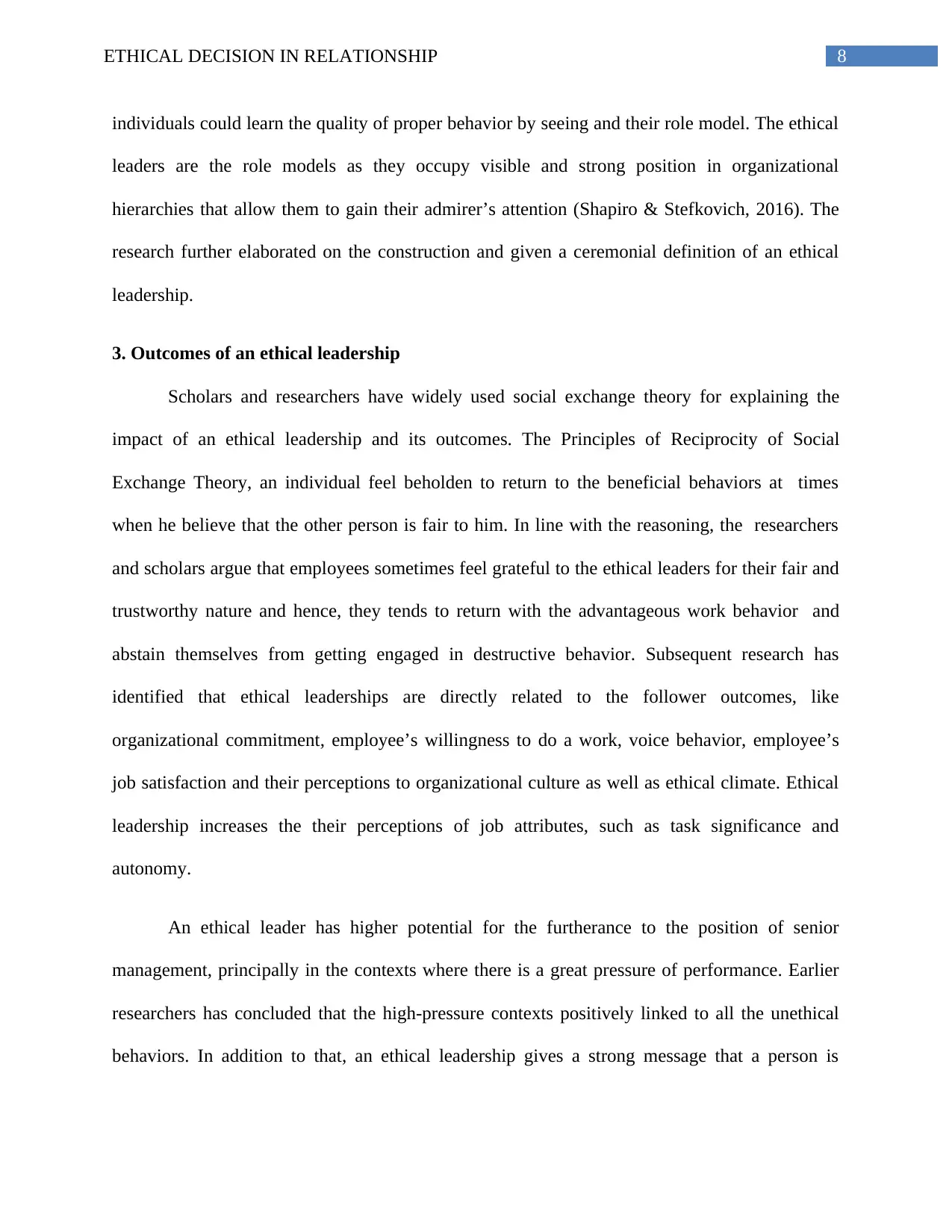
8ETHICAL DECISION IN RELATIONSHIP
individuals could learn the quality of proper behavior by seeing and their role model. The ethical
leaders are the role models as they occupy visible and strong position in organizational
hierarchies that allow them to gain their admirer’s attention (Shapiro & Stefkovich, 2016). The
research further elaborated on the construction and given a ceremonial definition of an ethical
leadership.
3. Outcomes of an ethical leadership
Scholars and researchers have widely used social exchange theory for explaining the
impact of an ethical leadership and its outcomes. The Principles of Reciprocity of Social
Exchange Theory, an individual feel beholden to return to the beneficial behaviors at times
when he believe that the other person is fair to him. In line with the reasoning, the researchers
and scholars argue that employees sometimes feel grateful to the ethical leaders for their fair and
trustworthy nature and hence, they tends to return with the advantageous work behavior and
abstain themselves from getting engaged in destructive behavior. Subsequent research has
identified that ethical leaderships are directly related to the follower outcomes, like
organizational commitment, employee’s willingness to do a work, voice behavior, employee’s
job satisfaction and their perceptions to organizational culture as well as ethical climate. Ethical
leadership increases the their perceptions of job attributes, such as task significance and
autonomy.
An ethical leader has higher potential for the furtherance to the position of senior
management, principally in the contexts where there is a great pressure of performance. Earlier
researchers has concluded that the high-pressure contexts positively linked to all the unethical
behaviors. In addition to that, an ethical leadership gives a strong message that a person is
individuals could learn the quality of proper behavior by seeing and their role model. The ethical
leaders are the role models as they occupy visible and strong position in organizational
hierarchies that allow them to gain their admirer’s attention (Shapiro & Stefkovich, 2016). The
research further elaborated on the construction and given a ceremonial definition of an ethical
leadership.
3. Outcomes of an ethical leadership
Scholars and researchers have widely used social exchange theory for explaining the
impact of an ethical leadership and its outcomes. The Principles of Reciprocity of Social
Exchange Theory, an individual feel beholden to return to the beneficial behaviors at times
when he believe that the other person is fair to him. In line with the reasoning, the researchers
and scholars argue that employees sometimes feel grateful to the ethical leaders for their fair and
trustworthy nature and hence, they tends to return with the advantageous work behavior and
abstain themselves from getting engaged in destructive behavior. Subsequent research has
identified that ethical leaderships are directly related to the follower outcomes, like
organizational commitment, employee’s willingness to do a work, voice behavior, employee’s
job satisfaction and their perceptions to organizational culture as well as ethical climate. Ethical
leadership increases the their perceptions of job attributes, such as task significance and
autonomy.
An ethical leader has higher potential for the furtherance to the position of senior
management, principally in the contexts where there is a great pressure of performance. Earlier
researchers has concluded that the high-pressure contexts positively linked to all the unethical
behaviors. In addition to that, an ethical leadership gives a strong message that a person is
⊘ This is a preview!⊘
Do you want full access?
Subscribe today to unlock all pages.

Trusted by 1+ million students worldwide
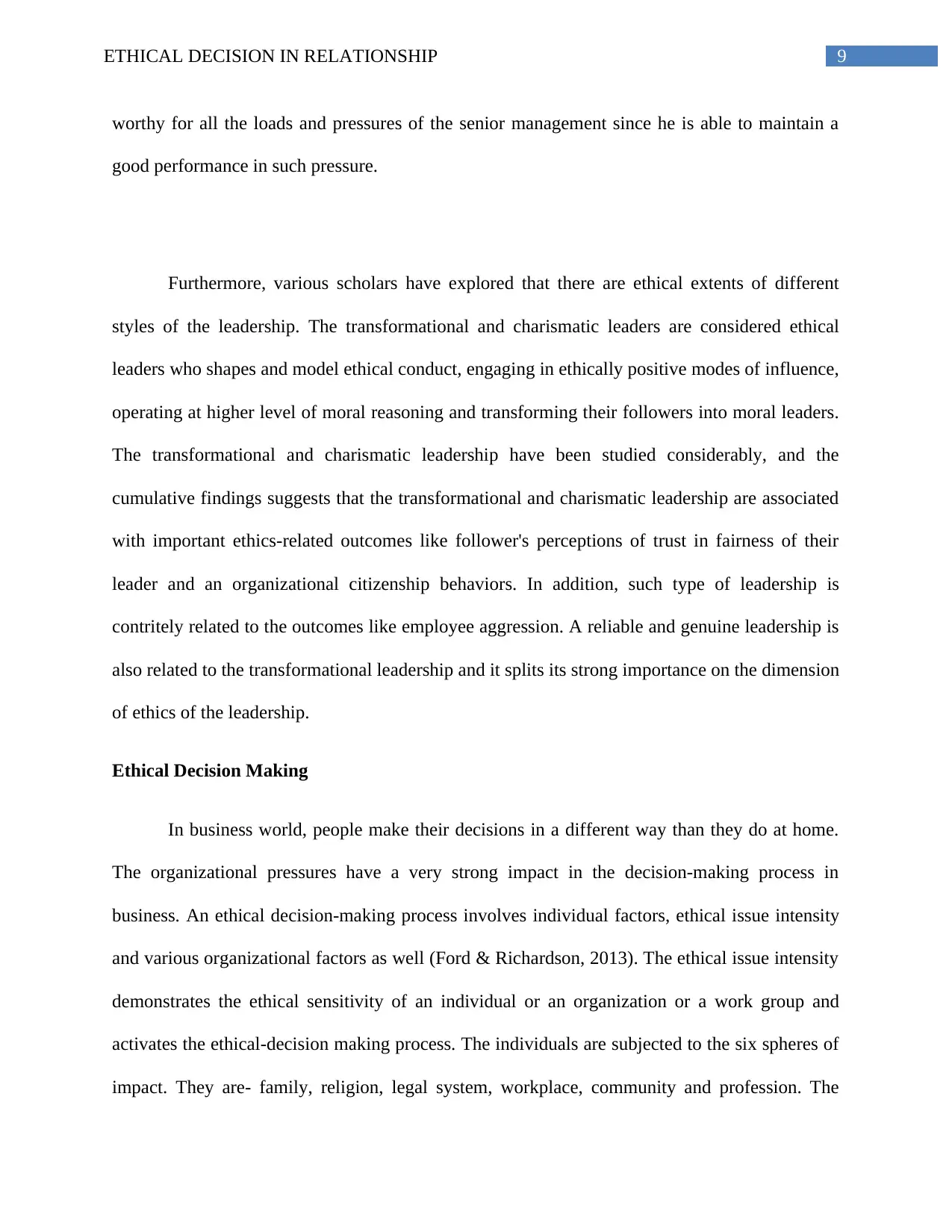
9ETHICAL DECISION IN RELATIONSHIP
worthy for all the loads and pressures of the senior management since he is able to maintain a
good performance in such pressure.
Furthermore, various scholars have explored that there are ethical extents of different
styles of the leadership. The transformational and charismatic leaders are considered ethical
leaders who shapes and model ethical conduct, engaging in ethically positive modes of influence,
operating at higher level of moral reasoning and transforming their followers into moral leaders.
The transformational and charismatic leadership have been studied considerably, and the
cumulative findings suggests that the transformational and charismatic leadership are associated
with important ethics-related outcomes like follower's perceptions of trust in fairness of their
leader and an organizational citizenship behaviors. In addition, such type of leadership is
contritely related to the outcomes like employee aggression. A reliable and genuine leadership is
also related to the transformational leadership and it splits its strong importance on the dimension
of ethics of the leadership.
Ethical Decision Making
In business world, people make their decisions in a different way than they do at home.
The organizational pressures have a very strong impact in the decision-making process in
business. An ethical decision-making process involves individual factors, ethical issue intensity
and various organizational factors as well (Ford & Richardson, 2013). The ethical issue intensity
demonstrates the ethical sensitivity of an individual or an organization or a work group and
activates the ethical-decision making process. The individuals are subjected to the six spheres of
impact. They are- family, religion, legal system, workplace, community and profession. The
worthy for all the loads and pressures of the senior management since he is able to maintain a
good performance in such pressure.
Furthermore, various scholars have explored that there are ethical extents of different
styles of the leadership. The transformational and charismatic leaders are considered ethical
leaders who shapes and model ethical conduct, engaging in ethically positive modes of influence,
operating at higher level of moral reasoning and transforming their followers into moral leaders.
The transformational and charismatic leadership have been studied considerably, and the
cumulative findings suggests that the transformational and charismatic leadership are associated
with important ethics-related outcomes like follower's perceptions of trust in fairness of their
leader and an organizational citizenship behaviors. In addition, such type of leadership is
contritely related to the outcomes like employee aggression. A reliable and genuine leadership is
also related to the transformational leadership and it splits its strong importance on the dimension
of ethics of the leadership.
Ethical Decision Making
In business world, people make their decisions in a different way than they do at home.
The organizational pressures have a very strong impact in the decision-making process in
business. An ethical decision-making process involves individual factors, ethical issue intensity
and various organizational factors as well (Ford & Richardson, 2013). The ethical issue intensity
demonstrates the ethical sensitivity of an individual or an organization or a work group and
activates the ethical-decision making process. The individuals are subjected to the six spheres of
impact. They are- family, religion, legal system, workplace, community and profession. The
Paraphrase This Document
Need a fresh take? Get an instant paraphrase of this document with our AI Paraphraser
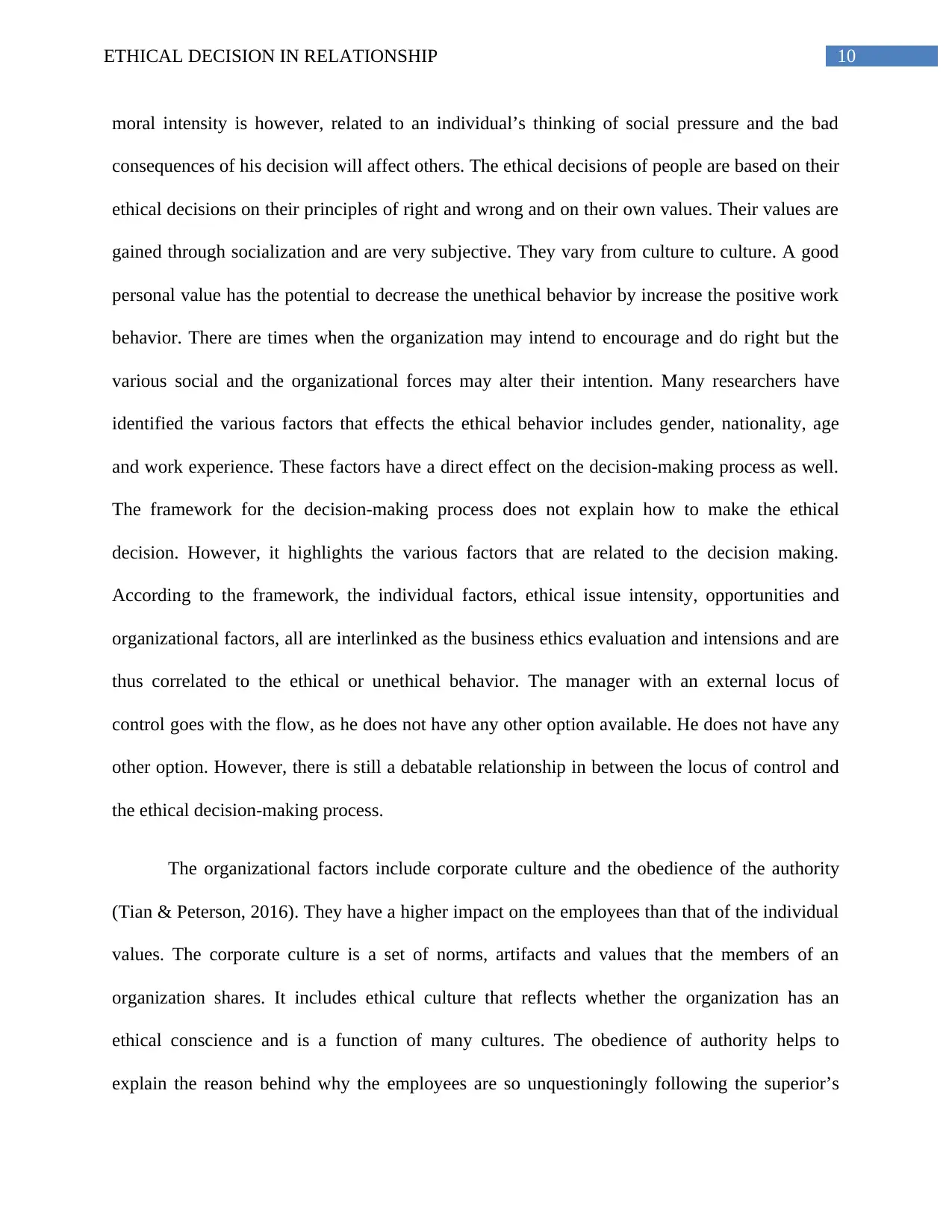
10ETHICAL DECISION IN RELATIONSHIP
moral intensity is however, related to an individual’s thinking of social pressure and the bad
consequences of his decision will affect others. The ethical decisions of people are based on their
ethical decisions on their principles of right and wrong and on their own values. Their values are
gained through socialization and are very subjective. They vary from culture to culture. A good
personal value has the potential to decrease the unethical behavior by increase the positive work
behavior. There are times when the organization may intend to encourage and do right but the
various social and the organizational forces may alter their intention. Many researchers have
identified the various factors that effects the ethical behavior includes gender, nationality, age
and work experience. These factors have a direct effect on the decision-making process as well.
The framework for the decision-making process does not explain how to make the ethical
decision. However, it highlights the various factors that are related to the decision making.
According to the framework, the individual factors, ethical issue intensity, opportunities and
organizational factors, all are interlinked as the business ethics evaluation and intensions and are
thus correlated to the ethical or unethical behavior. The manager with an external locus of
control goes with the flow, as he does not have any other option available. He does not have any
other option. However, there is still a debatable relationship in between the locus of control and
the ethical decision-making process.
The organizational factors include corporate culture and the obedience of the authority
(Tian & Peterson, 2016). They have a higher impact on the employees than that of the individual
values. The corporate culture is a set of norms, artifacts and values that the members of an
organization shares. It includes ethical culture that reflects whether the organization has an
ethical conscience and is a function of many cultures. The obedience of authority helps to
explain the reason behind why the employees are so unquestioningly following the superior’s
moral intensity is however, related to an individual’s thinking of social pressure and the bad
consequences of his decision will affect others. The ethical decisions of people are based on their
ethical decisions on their principles of right and wrong and on their own values. Their values are
gained through socialization and are very subjective. They vary from culture to culture. A good
personal value has the potential to decrease the unethical behavior by increase the positive work
behavior. There are times when the organization may intend to encourage and do right but the
various social and the organizational forces may alter their intention. Many researchers have
identified the various factors that effects the ethical behavior includes gender, nationality, age
and work experience. These factors have a direct effect on the decision-making process as well.
The framework for the decision-making process does not explain how to make the ethical
decision. However, it highlights the various factors that are related to the decision making.
According to the framework, the individual factors, ethical issue intensity, opportunities and
organizational factors, all are interlinked as the business ethics evaluation and intensions and are
thus correlated to the ethical or unethical behavior. The manager with an external locus of
control goes with the flow, as he does not have any other option available. He does not have any
other option. However, there is still a debatable relationship in between the locus of control and
the ethical decision-making process.
The organizational factors include corporate culture and the obedience of the authority
(Tian & Peterson, 2016). They have a higher impact on the employees than that of the individual
values. The corporate culture is a set of norms, artifacts and values that the members of an
organization shares. It includes ethical culture that reflects whether the organization has an
ethical conscience and is a function of many cultures. The obedience of authority helps to
explain the reason behind why the employees are so unquestioningly following the superior’s
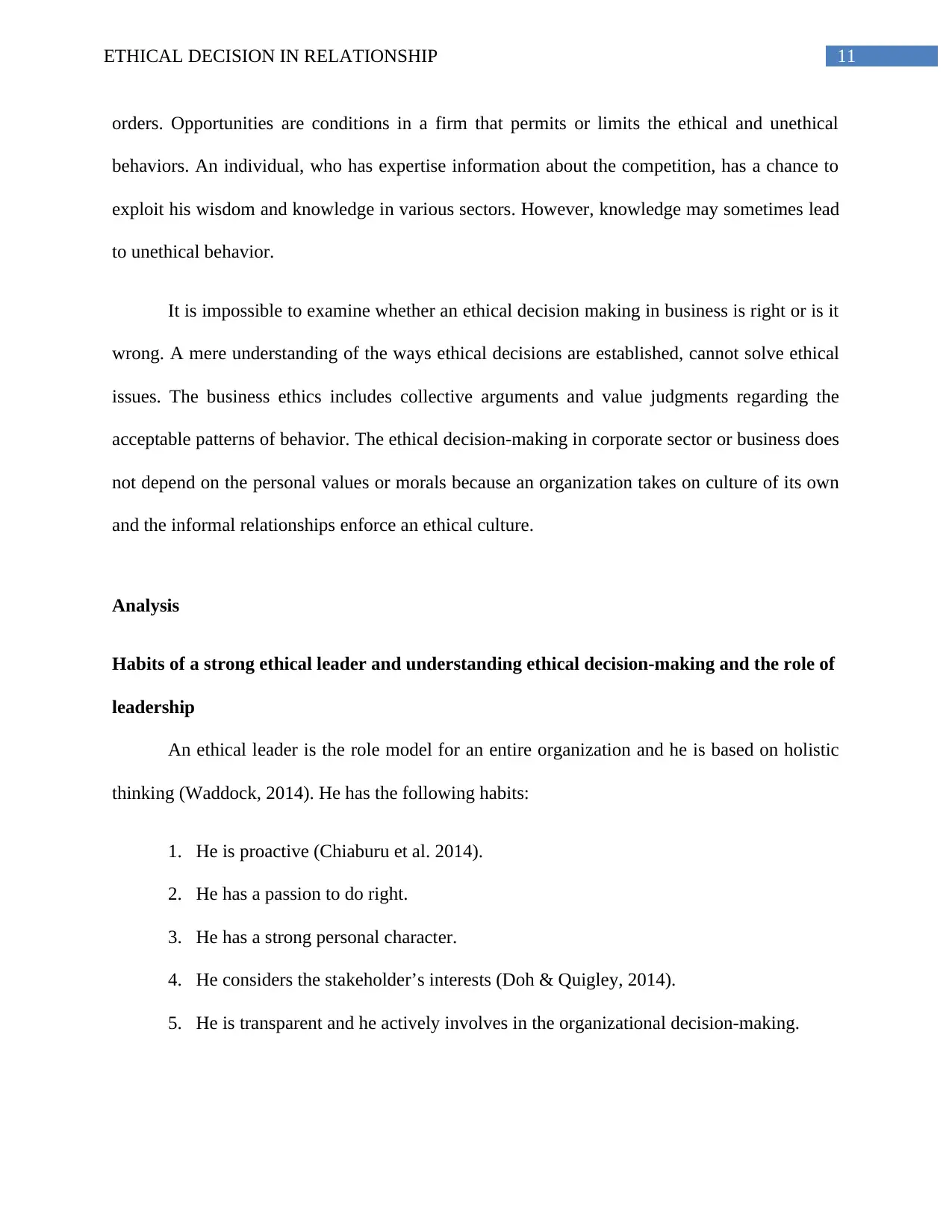
11ETHICAL DECISION IN RELATIONSHIP
orders. Opportunities are conditions in a firm that permits or limits the ethical and unethical
behaviors. An individual, who has expertise information about the competition, has a chance to
exploit his wisdom and knowledge in various sectors. However, knowledge may sometimes lead
to unethical behavior.
It is impossible to examine whether an ethical decision making in business is right or is it
wrong. A mere understanding of the ways ethical decisions are established, cannot solve ethical
issues. The business ethics includes collective arguments and value judgments regarding the
acceptable patterns of behavior. The ethical decision-making in corporate sector or business does
not depend on the personal values or morals because an organization takes on culture of its own
and the informal relationships enforce an ethical culture.
Analysis
Habits of a strong ethical leader and understanding ethical decision-making and the role of
leadership
An ethical leader is the role model for an entire organization and he is based on holistic
thinking (Waddock, 2014). He has the following habits:
1. He is proactive (Chiaburu et al. 2014).
2. He has a passion to do right.
3. He has a strong personal character.
4. He considers the stakeholder’s interests (Doh & Quigley, 2014).
5. He is transparent and he actively involves in the organizational decision-making.
orders. Opportunities are conditions in a firm that permits or limits the ethical and unethical
behaviors. An individual, who has expertise information about the competition, has a chance to
exploit his wisdom and knowledge in various sectors. However, knowledge may sometimes lead
to unethical behavior.
It is impossible to examine whether an ethical decision making in business is right or is it
wrong. A mere understanding of the ways ethical decisions are established, cannot solve ethical
issues. The business ethics includes collective arguments and value judgments regarding the
acceptable patterns of behavior. The ethical decision-making in corporate sector or business does
not depend on the personal values or morals because an organization takes on culture of its own
and the informal relationships enforce an ethical culture.
Analysis
Habits of a strong ethical leader and understanding ethical decision-making and the role of
leadership
An ethical leader is the role model for an entire organization and he is based on holistic
thinking (Waddock, 2014). He has the following habits:
1. He is proactive (Chiaburu et al. 2014).
2. He has a passion to do right.
3. He has a strong personal character.
4. He considers the stakeholder’s interests (Doh & Quigley, 2014).
5. He is transparent and he actively involves in the organizational decision-making.
⊘ This is a preview!⊘
Do you want full access?
Subscribe today to unlock all pages.

Trusted by 1+ million students worldwide
1 out of 18
Related Documents
Your All-in-One AI-Powered Toolkit for Academic Success.
+13062052269
info@desklib.com
Available 24*7 on WhatsApp / Email
![[object Object]](/_next/static/media/star-bottom.7253800d.svg)
Unlock your academic potential
Copyright © 2020–2026 A2Z Services. All Rights Reserved. Developed and managed by ZUCOL.




